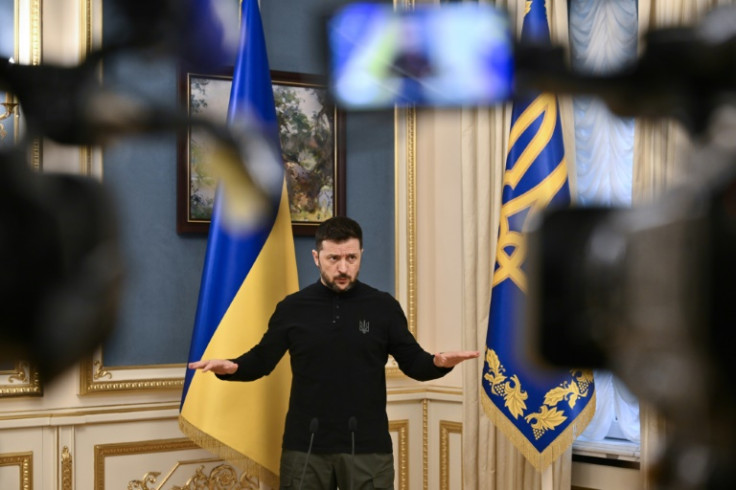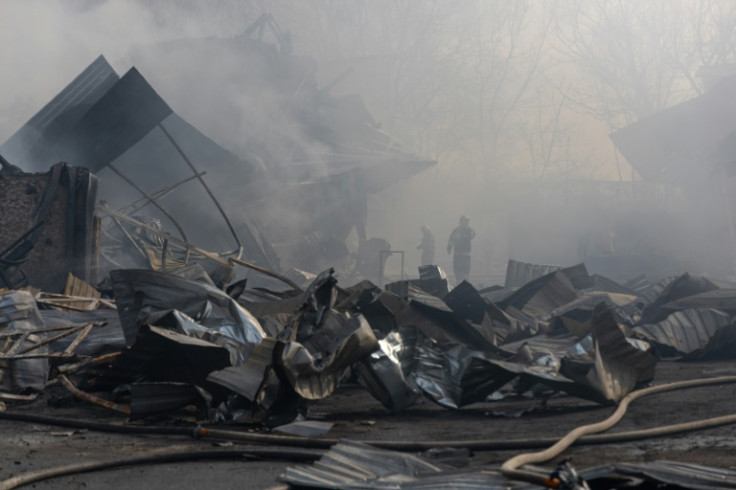
Russia and Ukraine accused each other Wednesday of derailing a US-brokered deal that could see the warring countries halt attacks on the Black Sea and against energy sites.
Ukrainian President Volodymyr Zelensky denounced a barrage of more than 100 drones launched by Russia overnight, hours after Kyiv agreed to a framework for a halt in fighting in the key waterway.
The United States said Tuesday that it had brokered the agreements in talks with both sides in Saudi Arabia, part of efforts by US President Donald Trump to quickly end Russia's invasion of Ukraine, now grinding through its fourth year.
But key questions over implementation remain. The Kremlin said the agreement to halt Black Sea strikes could come into force only after the lifting of restrictions on its agriculture sector.
Kyiv, which has voiced readiness to agree a complete 30-day ceasefire, said it came into effect when the US published details of the agreement late Tuesday.
"Launching such large-scale attacks after ceasefire negotiations is a clear signal to the whole world that Moscow is not going to pursue real peace," Zelensky posted on social media.
"There must also be clear pressure and strong action from the world on Russia -- more pressure, more sanctions from the United States -- to stop Russian strikes," Zelensky said.
Russia launched 117 drones over Ukraine overnight, of which 56 were downed and 48 were lost from radar without causing damage, the air force said.
The attack damaged buildings in the central city of Kryvyi Rig -- Zelensky's hometown -- and in the border region of Sumy, Ukrainian officials said.
Russia meanwhile accused Ukraine of attacking its energy infrastructure overnight, which Kyiv denied.
Russia is "spreading false and baseless accusations in order to prolong the war", the Ukrainian General Staff said.
President Vladimir Putin had ordered a 30-day truce on such targets last week but Kyiv says Russian strikes on energy sites have continued unabated.
Ukraine fired drones at a "gas storage facility" in the annexed Crimean peninsula as well as a power installation in the Bryansk region, the Russian defence ministry said.
"The Kyiv regime, while continuing to damage Russia's civilian energy infrastructure, is actually doing everything it can to disrupt the Russian-American agreements," it wrote.
Moscow says the 30-day truce has been in effect since March 18, but the monitoring of it is unclear and both the United States and Russia have issued contradictory statements.
The United States said Moscow and Kyiv had agreed only to "develop measures" towards an energy truce. A communications advisor for Zelensky said late Tuesday that Russian forces had struck Ukrainian energy sites eight times since Putin's order.
Trump's aim to hastily end the war has raised fears in Ukraine that it could be forced into ceding some of the 20 percent of its territory that Russia occupies, or that a US deal might not come with deterrents that would stop Russia from attacking again.
Zelensky and officials in Kyiv have claimed repeatedly that Moscow does in fact not want peace and is seeking only to continue advancing across the front line.
In a press conference in Kyiv on Wednesday, Foreign Minister Andriy Sybiga said Ukraine had "proven" it was not standing in the way of peace.
"Now Russia has to demonstrate through concrete actions -- not manipulations -- its real desire to end the war. Otherwise, it will be necessary to increase pressure on Moscow," he said.
Trump conceded in an interview Tuesday that "it could be they're dragging their feet", referring to Russia, adding that: "I think Russia would like to see it end, and I think Zelensky would like to see it end at this point."
Germany urged Russia on Wednesday to agree to a ceasefire without conditions.
"It is not a situation for dialogue when a ceasefire is repeatedly tied to concessions and new demands... we must not be deceived by the Russian president," Foreign Minister Annalena Baerbock said.









